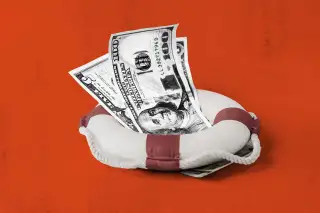Your Emergency Fund Is Probably Too Small Now (Thanks, Inflation)

Are you really ready for a rainy day?
Prices are rising at their fastest rate in 40 years. We may be headed for a recession, or we may already be in one (it depends who you ask). The stock market is still in bear territory, well below the soaring highs of the last two years. Companies in certain industries are starting to lay off workers, too.
The headlines may sound scary, but they’re also a good reminder to revisit your emergency fund — the pile of cash you keep socked away for unexpected expenses like a car repair, medical bill or job loss. Experts generally recommend keeping between three and six months' worth of expenses in an account separate from the rest of your money in case of an emergency, though the exact amount will vary depending on your individual circumstances.
But right now, with inflation at a record high, there’s a pretty good chance those monthly expenses are higher than they used to be. That means your emergency fund is likely too small.
For instance, grocery prices were up more than 12% on an annual basis in June, according to the most recent data from the Bureau of Labor Statistics. While gas prices are finally falling from their eye-watering highs earlier this spring, they’re still roughly 90 cents per gallon higher on average than they were last year, according to price-tracking app GasBuddy. Back in June, experts from Moody’s Analytics estimated that inflation was costing the average American household an extra $460 per month.
“What you thought you could afford a year ago may not stretch as far in the future,” says Liz Ewing, chief financial officer at Marcus by Goldman Sachs, an online-only consumer bank. Because of this, she adds, it’s important to review your spending patterns and make sure your rainy day fund is “right-sized for today’s pricing.”
That’s not to mention the uncertain road ahead for the economy. Growth is slowing, consumer confidence is weakening, the housing market is cooling even though home prices continue to rise, and experts are divided on what’s next for the stock market. It’s difficult to predict what’s coming next, and that’s a good argument for stashing a little extra in your emergency fund.
“When there's uncertainty,” Ewing says, “it is a good time to be saving more money.”
If you already have some emergency savings, now is a great time to make sure you’re comfortable with the amount. Will it truly cover between three and six months of your current expenses (or more if you’re aiming for a higher balance)? If not, can you find room in your budget to transfer a little extra to that account each month?
And if you don’t have any emergency savings yet, it’s never too late to start building that cushion.
One good place to put your emergency fund
Thankfully, rising prices come with one silver lining.
As the Federal Reserve hikes its benchmark interest rate to try to bring down prices, banks are also raising interest rates on high-yield savings accounts offered by online banks — which happen to be one of the best places to put your emergency savings.
Interest rates on these accounts tend to be much higher than on traditional and savings accounts, but they fell sharply during the pandemic. But as the central bank raises rates, high-yield savings account rates are rising, too, from around half a percent at the beginning of the year to triple that or more today. Rates vary depending on the bank, but Marcus has already hiked their APY to 1.5% and Ally has reached 1.4%.
That perk is by design on the part of the Fed, Ewing says: "You're incentivized to save more because you can earn more on your savings.”
More from Money:
How Big Should Your 'Rainy Day' Savings Account Actually Be?
Inflation Is (Still) at a Record High, but a Few Items Are Actually Getting Cheaper
Here's How Much Cash Investors Should Hold During a Bear Market (and Potential Recession)